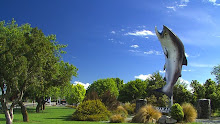 Regrettably, my time in the small fishing village of Kaikoura eventually came to an end. Duty called and new shoots beckoned me northwards towards Nelson and the Marlborough Sounds at the tip of the south island. As I passed snow-flecked mountaintops and steel-grey rivers frantically dumping their glacier-melt into the deep coastal waters of the Chatham Rise and Bounty Trough, I couldn't help but feel a twinge of sadness. Something about Kaikoura's constant weather, the slow pace of life, and the ocean air reminded me of my hometown Carlsbad, back in San Diego. But Kaikoura was already rapidly receding into the distance and I slowly turned my thoughts northward.
Regrettably, my time in the small fishing village of Kaikoura eventually came to an end. Duty called and new shoots beckoned me northwards towards Nelson and the Marlborough Sounds at the tip of the south island. As I passed snow-flecked mountaintops and steel-grey rivers frantically dumping their glacier-melt into the deep coastal waters of the Chatham Rise and Bounty Trough, I couldn't help but feel a twinge of sadness. Something about Kaikoura's constant weather, the slow pace of life, and the ocean air reminded me of my hometown Carlsbad, back in San Diego. But Kaikoura was already rapidly receding into the distance and I slowly turned my thoughts northward.
Before this gloomy spell could overtake me and blossom into homesickness I emerged out of the verdant green winery region of Blenheim and burst onto the Marlborough Sounds. And what a sight it was! With crystalline blue waters, golden sand beaches, bright skies, and friendly people, Nelson was a cinematic jewel. Not to be caught with idle feet, I immediately proceeded into downtown Nelson and met up with my aquaculture contact to talk about the operations based in Nelson. Salmon, pacific oysters, and the world-renowed greenshell mussel were some of the main exports. Needless to say we had a long chat about sustainability, aquaculture, and what it meant for the future of fishing around the globe. In the end I told them that I was most interested in documenting and displaying what sustainability actually looked like in practice. I imagine for most of you, myself included, sustainable fisheries seems a murky and sometimes fishy sounding proposal. I mean, what does sustainability actually look like in action? Some of my following questions related to environmental impacts, wild stock assessments, regulations, health inspections, the "organic-ness" of the product, handling, processing, etc. In the end it was important that I got a good grasp on how "sustainable" these fisheries were before I shot any footage.

After the meeting we set up a few shoots for the coming week. I was pleasantly surprised that the aquaculture operations didn't use water pesticides or antibiotics and secondly, each mussel, oyster, and salmon was handled individually as it came out of the pens. In fact, they said that to farm mussels all they did was set up ropes anchored to the bottom of the seabed and the mussels grew themselves, content in the clean and warm waters of the Marlborough Sounds. Of course a gross simplification of the process, it was still a miracle that pollution was one of their only main concerns, and a small one at that.



(above are screen-shots from my doco. footage)
Phewww! It was a lot to take in and even more to ponder. Yet I found my thoughts lingering over that conversation later the same evening as I sat atop a hill overlooking Nelson (a hill which was the geographic center of New Zealand in fact). I couldn't help but wonder, what did this mean for my documentary and what role would aquaculture play in 21st century ocean management?






